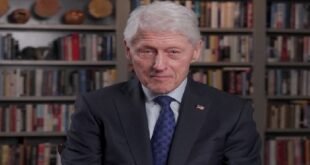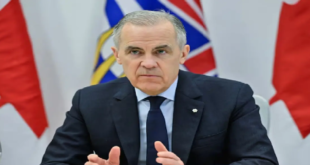01-05-2025
NEW YORK: A United States judge has ordered the release of Columbia University student and pro-Palestine protestors Mohsen Mahdawi as a case challenging his deportation proceeds.
In Burlington, Vermont, on Wednesday, US District Judge Geoffrey Crawford ruled Mahdawi could leave the Northwest State Correctional Facility, where he had been held since immigration officials arrested him earlier this month.
 Mahdawi walked out of the court with both hands in the air, flashing peace signs as supporters greeted him with cheers.
Mahdawi walked out of the court with both hands in the air, flashing peace signs as supporters greeted him with cheers.
As he spoke, he shared a message for President Donald Trump, whose administration has led a crackdown on student protesters who have denounced Israel’s war in Gaza.
“I am not afraid of you,” Mahdawi said to Trump. He also addressed the people of Palestine and sought to dispel perceptions that the student protest movement was anything but peaceful.
“We are pro-peace and antiwar,” Mahdawi explained. “To my people in Palestine: I feel your pain, I see your suffering, and I see freedom, and it is very soon.”
Mahdawi, a legal US resident who had been a leader in the protests at Columbia University, was detained on April 14 while attending a citizenship interview. Video of him being led away in handcuffs spread widely across social media.
His arrest came as part of a wider push by the Trump administration to target visa holders and permanent residents for their pro-Palestine advocacy. Trump has also pressured top universities to crack down on pro-Palestine protests, in the name of combating anti-Semitism.
Critics, however, say that rationale is an excuse to exert greater control over academia and stifle opposing views.
What’s in the ruling?
While the immigration case against Mahdawi will proceed, Judge Crawford ruled the student activist posed no flight risk and could be released to attend his graduation next month in New York City.
 It is possible the US government may appeal Mahdawi’s release, but the judge’s ruling allows him to leave the state of Vermont and fight his deportation from outside a detention facility.
It is possible the US government may appeal Mahdawi’s release, but the judge’s ruling allows him to leave the state of Vermont and fight his deportation from outside a detention facility.
The Trump administration, however, had opposed his release. Its lawyers argued that Mahdawi’s detention was “constitutionally valid aspect of the deportation process”.
Mahdawi’s lawyers have countered that his detainment treads on his constitutional rights to free speech.
“Mohsen has committed no crime, and the government’s only supposed justification for holding him in prison is the content of his speech,” Lia Ernst, a lawyer with the American Civil Liberties Union who is representing Mahdawi, said in a statement following his release.
The Trump administration has taken the broad position that constitutional speech protections only apply to US citizens, a question that could eventually be decided by the US Supreme Court.
In court filings, government lawyers have cited the Immigration and Nationality Act of 1952 as the legal basis for seeking Mahdawi’s deportation.
A rarely used part of the law allows the US to deport foreign nationals “whose presence or activities in the United States” gives the secretary of state “reasonable ground to believe (they) would have potentially serious adverse foreign policy consequences”. (Int’l News Desk)
 Pressmediaofindia
Pressmediaofindia




